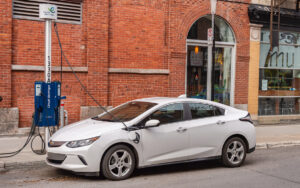The latest round of Zero Emission Vehicle Infrastructure Program (ZEVIP) funding will cover up to 50 per cent of project costs to a maximum of $5 million, with proposals open until August 11, says NRCan

Natural Resources Canada is once again opening a round of funding through the Zero Emission Vehicle Infrastructure Program to support electric and hydrogen refuelling projects across Canada.
The latest round of Zero Emission Vehicle Infrastructure Program (ZEVIP) funding from NRCan will cover up to 50 per cent of project costs to a maximum of $5 million, with proposals open until August 11
Natural Resources Canada is once again opening a round of funding through the Zero Emission Vehicle Infrastructure Program (ZEVIP) to support electric and hydrogen refuelling projects across Canada.
Eligible projects in the current request for proposals (RFPs) call-out include: public, on-street, multi-unit residential building, workplace (not including home offices) or fleet vehicle refuelling infrastructure.
Each project may be funded up to 50 per cent of the total cost to a maximum of $5 million per project and a maximum of $2 million per project for delivery organizations. Delivery organization include The Atmospheric Fund, EPCOR Utilities, Clean Nova Scotia Foundation, Pollution Probe and Indigenous Clean Energy Social Enterprise, among others.

The 2022 federal budget provided $400 million in new funding for ZEVIP (bringing the government’s total ZEVIP commitment to $680 million), which extends the program to March 2027. Its goal is to help finance the addition of 50,000 new zero-emission vehicle (ZEV) chargers to Canada’s public network.
In addition, the government allocated $500 million in the budget for heavy-duty commercial charging projects.
In total, since it began in 2019, ZEVIP has received $680 million in government funding to disperse among various third-party charging infrastructure providers over six years.
Project requirements
As each of the ZEVIP funding rounds is intended to target different areas of ZEV charging or refuelling infrastructure, the requirements for the RFPs vary. For this segment of the program the following expenses are considered eligible for ZEVIP contribution:
- Salary and benefits;
- Professional services (e.g. marketing; data collection; logistics; printing; distribution);
- Reasonable travel costs, including transportation, meals and accommodation;
- Capital expenses, including informatics and other equipment or infrastructure;
- Rental fees or leasing costs;
- License fees and permits;
- Costs associated with Environmental Assessments;
- GST, PST and HST net of any tax rebate to which the recipient is entitled; and
- Overhead expenses directly related to the project, included in the 15 per cent maximum of NRCan funding, will be considered to a maximum of 15 percent of Eligible Expenditures.
Expenditures that are not covered by the federal funding include:
- In-kind;
- Land costs;
- Legal costs;
- Ongoing operating costs and;
- Costs incurred outside the Eligible Expenditure Period.
Successful applicants for previous funding rounds include several Canadian post-secondary institutions, municipalities, multi-unit residential buildings and stratas, utilities, electricity generators, private companies and automakers including Tesla and Ford.
Hydro Québec currently holds the highest funded project for the ZEVIP fund of $4,970,000 for 121 public street chargers.






